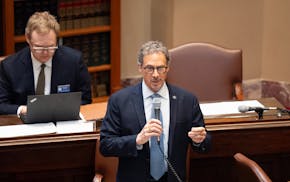Minneapolis city leaders have a long to-do list for the state Legislature, from ending what some of them called slave labor at state prisons to getting help paying off the city's remaining debt on U.S. Bank Stadium.
Although with a divided Legislature and the two parties still fighting over control of the House, it's unclear if the progressive city's priorities will go far this year.
Mayor Jacob Frey's administration and the Minneapolis City Council put together their agenda and policy positions for the 2025 legislative session. Among them:
- Give law enforcement more tools to combat street racing, such as new or stronger penalties.
- Modify the state open records law to make information about police misconduct more accessible to prosecutors, who are legally required to disclose such information to defense attorneys.
- Require police officers to be in separate collective bargaining units than their supervisors, sergeants and lieutenants.
- Get help paying off the city's share of U.S. Bank Stadium debt. While the state of Minnesota paid off early $377 million in stadium construction debt in 2023, the city was still on the hook for about $333 million at the time.
- Repeal or amend the statute that established the Municipal Building Commission, an independent board that has overseen the historic Minneapolis City Hall and Hennepin County Courthouse since 1904.
- Expand the boundaries of the city's special downtown taxing district — where there's a special 3% tax on liquor, lodging and restaurant sales — to include all of the North Loop. A bill expanding the border while lowering the tax rate stalled in the Legislature last year. This has been mentioned as a possible new revenue source for the city.
- Restrict state and local officials from cooperating with federal immigration enforcement efforts as President Donald Trump returns to office with aspirations for mass deportations.
- Give police more tools to combat street racing, such as new or stronger penalties.
- Repeal the state prohibition on cities imposing a ban on plastic bags. In 2017, the GOP-controlled Legislature stopped cities from banning any type of bags to pre-empt a Minneapolis ban on plastic bags passed in 2016.
Ending low prison labor wages
The City Council made a handful of changes to the city's legislative wish list, adding support for legislation to pay state prisoners more money to work.
State corrections documents indicate prisoners are paid 25 cents to $2 an hour.
Council Member Robin Wonsley said legislation to "end slavery" in prisons is expected to be introduced this session. Prisoners return home without skills or money, exacerbating their problems and increasing recidivism, she said.
Council rejects open records law changes
City staffers had proposed supporting changes to state law to help cities deal with the cost of responding to requests for public documents that are "vague or large."
The council voted 12-0 to reject any changes to the open records law related to such record requests. Council Member Jason Chavez said while he supports state funding to help cover the city's costs, he opposes changes that could reduce transparency or result in new charges for public records.
"I think we should strive to be a transparent government and not add guardrails to prevent people from accessing government," he said during a December committee meeting.
Assistant City Clerk Christian Rummelhoff, who oversees records management for the city, told the council Tuesday that the records office workload has increased 10% annually, on average, since 2018, from 1,820 requests in 2018 to over 5,300 last year. Rummelhoff said the growth in records requests is unsustainable, even though staffing has increased from one person in 2015 to 14 last year.
The average time it takes to close a records request is 32 days, he said.
DOJ wants death penalty for Luigi Mangione if convicted of killing UHC's Brian Thompson

Lawsuit: Twin Cities pediatrician altered records in shaken baby murder case as part of conspiracy

